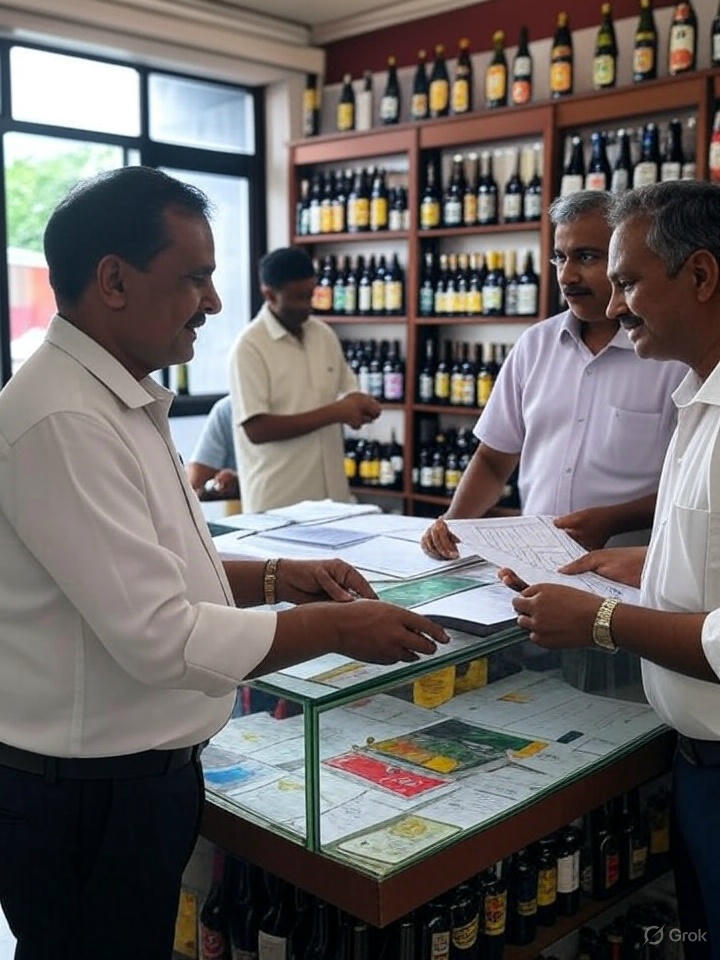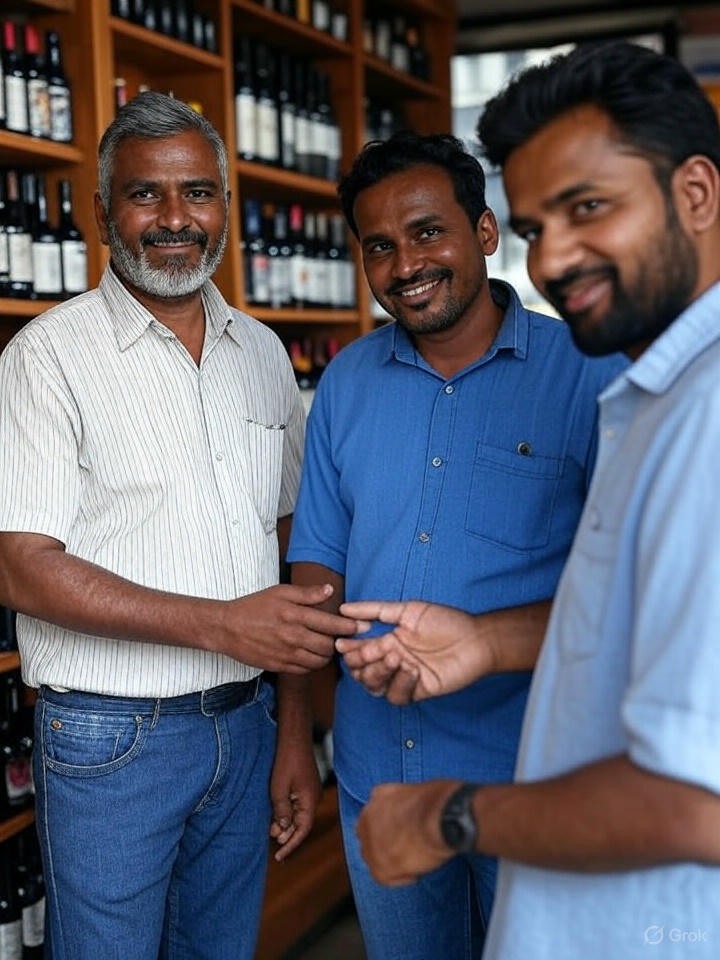India’s evolving consumer landscape presents a unique opportunity for entrepreneurs in the beverage alcohol retail sector. Rising disposable incomes, urbanization, and a growing appreciation for premium offerings like craft beer shop selections and diverse wine shop choices signal potential. However, launching such a venture is far from simple. It demands navigating one of the most complex regulatory environments globally. This guide provides a comprehensive roadmap for your startup journey in the Indian beer and wine market.
1. Introduction: Opportunity Meets Regulation
The Indian alcoholic beverage market is significant and growing. While spirits dominate, the beer segment holds substantial volume, and the wine market, though smaller, is experiencing steady growth, particularly in urban centers. Premiumization is a key trend. However, success hinges entirely on understanding that alcohol is governed by state laws, not a central framework. Each state’s Excise Department acts as the supreme regulatory authority, making compliance the absolute bedrock of your business. Forget glamorous launches; this is a business built on meticulous adherence to rules, significant investment, and operational discipline. This guide focuses on standalone retail outlets (“shops”) for off-premises consumption, distinct from taverns, bars, or restaurants which require different licenses for on-premises service.

2. The Critical Foundation: Licenses and Legal Framework
This is the single most important phase. Failure here means no business.
- State-Specificity is Paramount: There is no single “India” license. The Maharashtra Prohibition Act, Delhi Excise Act, Karnataka Excise Act, and others dictate vastly different rules. Your first step is deep research into the current excise policy of your specific target state and often, the district or city. Policies change frequently!
- Types of Licenses (Examples Vary Widely):
- Beer Shop License (e.g., L-4, L-5): Permits selling domestic and/or international beer (sometimes includes cider or low-alcohol refreshers).
- Wine Shop License (e.g., L-6, FL-4): For selling wine (may sometimes include spirits or require a separate license).
- IMFL (Indian Made Foreign Liquor) License (e.g., L-1, FL-1): Required for spirits like whisky, rum, vodka. Often distinct from beer/wine licenses.
- Special Licenses: May exist for premium shops, imported goods only, or specific locations.
- Obtaining the License:
- Method: Availability is tightly controlled. Licenses are often granted via competitive auctions (common, can be very expensive), lotteries, or rarely, direct application. Know your state’s system.
- Eligibility: Strict criteria apply: Minimum age (usually 25+), citizenship/residency, clean criminal record, financial solvency.
- The Application Process: Involves complex forms and extensive documentation – ID proofs, address proofs, financial statements, property papers (ownership/lease), affidavits, project reports. Accuracy is non-negotiable.
- Costs: Be prepared for substantial expenditure: A large, often non-refundable security deposit, hefty annual license fees, and application charges. Costs can range from lakhs to crores depending on location and license type.
- Timeline: Exercise extreme patience. The process, from application to grant, can take anywhere from 6 months to over 2 years due to scrutiny and bureaucratic steps.
3. Location: Where Compliance Dictates Viability
Finding the right spot isn’t just about foot traffic; it’s about legal viability.
- Zoning Restrictions (Sacrosanct): State regulations strictly mandate minimum distances from sensitive areas. Your chosen location must comply with distances from:
- Religious institutions (all faiths)
- Educational institutions (schools, colleges)
- Hospitals
- Government offices
- Other existing liquor vends
- Verification is Crucial: Obtain written confirmation from the local Excise Department and Municipal Corporation regarding zoning compliance before committing to a property.
- Visibility & Accessibility: Within the zoning constraints, seek high-visibility locations in commercial areas, near affluent residential hubs, with good parking and access.
- Premises Requirements: Adequate size for customer flow, secure storage (often with specific lock requirements), display shelving, counter space, staff area, and toilets. Storage must meet Excise Department standards (ventilation, security). Refrigeration is essential for beer and highly recommended for wine.

- Property Documentation: A clear title deed or legally binding lease agreement is mandatory. A No Objection Certificate (NOC) from the property owner is almost always required for the license application.
4. Mandatory Registrations & NOCs
Beyond the core excise license, several other registrations and No Objection Certificates (NOC) are essential:
- GST Registration: Mandatory for tax compliance on all sales.
- Shop & Establishment Act Registration: Basic license for operating a commercial establishment.
- FSSAI Registration/License: Often required for wine (considered a food product) and sometimes for beer. Check state rules.
- Municipal Trade License: Required by the local civic body.
- Fire Department NOC: Especially critical for your storage area, verifying fire safety compliance.
- Signage License: Permission for your shop’s signboard, adhering to size and placement regulations.
5. Financial Planning: The High-Cost Reality
Starting a beer or wine shop demands substantial capital. Key cost components include:
- License Costs: The security deposit and annual fee are typically the largest expenses.
- Real Estate: High rent for compliant locations in good areas, plus renovation, fit-out, and security installations (CCTV, alarms, grilles).
- Inventory: Significant initial investment in stock. Beer requires careful management due to shelf life; wine selection needs curation. Working capital must cover replenishment.
- Refrigeration: Commercial-grade chillers are vital for product quality.
- Technology: Point-of-Sale (POS) system, inventory management software, accounting software.
- Professional Fees: Budget for experienced Excise lawyers and Chartered Accountants – essential investments.
- Working Capital: Cover operating expenses (rent, salaries, utilities, taxes) for at least 6-12 months before reaching breakeven.
- Funding: Sources are limited. Personal savings are primary. Business loans are challenging for this sector; investors require solid projections and understanding of the risks.
6. Setting Up Operations: Beyond the License
With the license secured and premises ready, operational setup begins:
- Supplier Relationships: Establish contracts with authorized distributors, wholesalers, or potentially directly with breweries/wineries (if state rules permit). Understand supply chains, credit terms, and delivery schedules. You cannot source from unlicensed production units.
- Inventory Management: Develop a strategy balancing popular brands, premium offerings, and local/craft options. Implement strict First-In-First-Out (FIFO) rotation, especially for beer. Maintain optimal storage conditions. Leverage your POS system for tracking.
- Pricing Strategy: Prices are usually Maximum Retail Price (MRP) controlled. Your margin is determined by state excise policies and your buying price. Understand competitor pricing within the constraints.
- Staffing: Hire trustworthy individuals (background checks advised). Provide thorough training on: product knowledge (beer styles, wine regions), responsible retailing (rigorous age verification – check every ID), customer service, operating procedures, security protocols, and compliance requirements. Understand applicable labor laws.

7. The Grind: Ongoing Compliance & Responsibilities
Your license is a privilege, not a right. Maintaining it requires relentless adherence:
- Meticulous Record Keeping: Maintain all registers (sales, purchase, stock) in the exact format prescribed by the Excise Department. These are subject to frequent, unannounced inspections. Digital systems (POS) must align with manual requirements.
- Tax Compliance: File GST returns accurately and on time. Excise duty is usually paid at the wholesale/distributor level but ensure proper documentation.
- Operating Hours: Open and close strictly according to state-mandated timings. No exceptions.
- Dry Days: Absolutely no sales permitted on national (e.g., Republic Day, Independence Day, Gandhi Jayanti) and state-specific dry days (religious festivals, elections). Plan inventory accordingly.
- Age Verification: Implement a zero-tolerance policy. Train staff rigorously. Check valid photo ID (Aadhaar, DL, Passport) for every customer appearing under 25 (or the state-specified age). Display “No Sale to Minors” signage prominently.
- License Renewals: Mark calendars for all renewals (Excise, GST, Shop Act, FSSAI, Municipal) well in advance. Late renewal can mean closure.
- Inspections: Be prepared for regular inspections by Excise officials, police, and municipal authorities. Your premises and records must always be inspection-ready.
8. Marketing Within the Bounds of Law
Traditional advertising (TV, radio, print) is largely prohibited. Focus on permitted avenues:
- In-Store Experience: Your shop is your prime marketing tool. Ensure it’s clean, well-lit, organized, and inviting. Knowledgeable staff offering recommendations build loyalty. Clear pricing and visible licenses build trust. Impeccable refrigeration is critical for beer.
- Signage: Compliant, professional signage as per municipal and excise rules.
- Loyalty Programs: If permitted under state rules, these can encourage repeat business (check legality first).
- Limited Digital Presence: A basic website or social media page may be permissible only for providing contact information, location map, and operating hours. Absolutely no product promotion, pricing, or inducements to drink. Consult your lawyer before launching any online presence.
9. Challenges, Risks, and the Profit Potential
Be prepared for hurdles:
- Regulatory Volatility: Policies, license fees, and taxes change frequently, impacting costs and operations.
- High Entry & Operating Costs: Significant barrier to entry and pressure on profit margins.
- Intense Competition: From established shops and sometimes government-run outlets.
- Inventory Risks: Spoilage (beer), breakage, theft, shifting consumer preferences.
- Societal Stigma & Location Issues: Finding compliant locations can be difficult; potential local opposition exists.
- License Dependency: Your business’s entire value is tied to the license. Non-renewal or cancellation is catastrophic.
Despite challenges, a well-run, compliant beer or wine shop in a good location can achieve healthy profitability, driven by consistent demand and effective operations. Margins vary significantly by state and product mix.

10. Conclusion: Embarking with Eyes Wide Open
Launching a beer shop or wine shop in India is a significant entrepreneurial undertaking. It offers a tangible business opportunity within a growing market but demands unwavering commitment to navigating complex state laws and regulations. Success requires:
- Deep Due Diligence: Exhaustive research into your specific state’s excise policy.
- Professional Guidance: Investing in experienced Excise lawyers and CAs from day one.
- Substantial Capital: Realistic financial planning covering all costs, especially the license.
- Operational Excellence: Meticulous compliance, robust security, inventory control, and trained staff.
- Patience & Perseverance: The licensing and setup process is long and demanding.
If you possess the capital, patience, and discipline to operate strictly within the legal framework, a beer or wine shop can be a viable and rewarding retail venture in India. Prioritize compliance, respect the regulations, and focus on responsible retailing as the foundation for sustainable profit.
Good Reads



![[keyword]](https://learnxyz.in/wp-content/uploads/2026/02/Best-home-gym-setup-2026-adjustable-weights-resistance-bands-and.png)
![[keyword]](https://learnxyz.in/wp-content/uploads/2026/03/ओपनएआई-ने-लंदन-कार्यालय-के-बड़े-विस्तार-की-घोषणा-की.jpg)